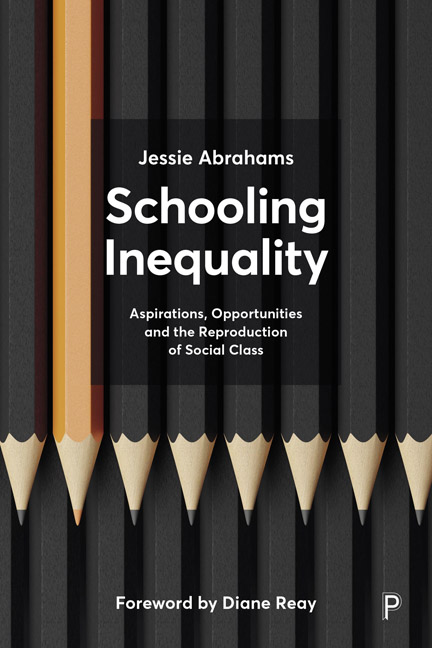Book contents
- Frontmatter
- Dedication
- Contents
- List of figures and tables
- List of abbreviations
- Acknowledgements
- Foreword
- Introduction
- 1 Reproduction: social class inequality in education
- 2 The three schools
- 3 Aspiration, aspiration, aspiration: “The only thing they’ve forced me to do is keep my options open”
- 4 Knowledge, familiarity and physical proximity: “Everyone in my family has gone to university, I don’t see why I shouldn’t”
- 5 Option blocks that block options (GCSEs)
- 6 Packages, facilitating subjects and ‘keeping the options open’ (A levels)
- 7 Institutional concerted cultivation
- 8 Aim lower: leashing aspirations and internalising notions of (in)ability
- 9 Jake’s story: a journey to reflexivity
- Conclusion
- Appendix I Questionnaire
- Appendix II Parental Standard Occupational Classification 2010 groups
- Appendix III Grand Hill Grammar careers event question sheet
- Appendix IV Vignette sample
- Notes
- References
- Index
7 - Institutional concerted cultivation
Published online by Cambridge University Press: 18 December 2024
- Frontmatter
- Dedication
- Contents
- List of figures and tables
- List of abbreviations
- Acknowledgements
- Foreword
- Introduction
- 1 Reproduction: social class inequality in education
- 2 The three schools
- 3 Aspiration, aspiration, aspiration: “The only thing they’ve forced me to do is keep my options open”
- 4 Knowledge, familiarity and physical proximity: “Everyone in my family has gone to university, I don’t see why I shouldn’t”
- 5 Option blocks that block options (GCSEs)
- 6 Packages, facilitating subjects and ‘keeping the options open’ (A levels)
- 7 Institutional concerted cultivation
- 8 Aim lower: leashing aspirations and internalising notions of (in)ability
- 9 Jake’s story: a journey to reflexivity
- Conclusion
- Appendix I Questionnaire
- Appendix II Parental Standard Occupational Classification 2010 groups
- Appendix III Grand Hill Grammar careers event question sheet
- Appendix IV Vignette sample
- Notes
- References
- Index
Summary
Chapters 7 and 8 turn to the institutional practices and ‘aspiration work’ undertaken primarily by careers advisors which reproduce inequalities across the three schools. In Chapter 7 this is done largely through an in-depth analysis of notes from my observation of a careers event for sixth-form pupils at Grand Hill Grammar. The event saw numerous Grand Hill alumni in leading positions in society return to the school to offer support and guidance to current pupils. In this chapter I discuss my observations of the process by which young people are schooled in how to construct themselves as ‘well rounded’, how to ‘network’ and how to ‘get around the systems’. Inspired by the work of Annette Lareau (2011), I introduce and unpack the concept of institutional concerted cultivation as a tool to understand the way in which Grand Hill Grammar, equipped with an advantaged position in the field, works to cultivate within its pupils a particular disposition towards success. I show how the institution picks up where parents leave off in utilising their resources to cultivate young people in a concerted fashion to enable them to ‘get ahead’ in the competition for university places and professional careers. This chapter begins by drawing on ethnographic data collected throughout my research by way of understanding the distinct circumstances through which young people begin their educational journeys. I explore the way in which some bodies experience greater regulation and restriction within the context of the school, while others are afforded greater agency and freedom. In unpacking the spaces of the three schools I consider the subtly different messages of meritocracy and aspiration sent off by each institution. Following this, I go on to explore the workings of institutional concerted cultivation through an example of an alumni event at Grand Hill.
Socio-spatially embedded practices and meritocratic messages
When I arrived for my meeting [at Grand Hill Grammar] I was immediately taken by the school's grandness and peacefulness. The building was beautiful, very old looking but extremely well kept (not falling down at all rather sparkly and clean).
- Type
- Chapter
- Information
- Schooling InequalityAspirations, Opportunities and the Reproduction of Social Class, pp. 98 - 110Publisher: Bristol University PressPrint publication year: 2024

